Baptism of Russia"
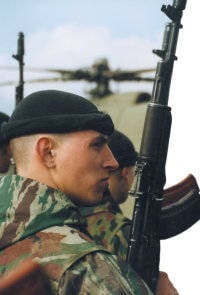 CALCULATE the age of special units on the calendar, probably not quite right. For a normal army unit and for half a century did not go through the harsh school, which happened to defeat the detachment "Russia" in just half a decade. The detachment emerged from these military trials not as a five-year-old child, but as a mature knight, sophisticated battle fighting experience, tempered by bitterness of battle losses, ready to perform any tasks in the most extreme conditions. The commander of the detachment can serve as its commander, Colonel Vladimir Ivanov: strong and stocky, with a cap of early gray hair, a soft but imperious look, temperament, inner dignity.
CALCULATE the age of special units on the calendar, probably not quite right. For a normal army unit and for half a century did not go through the harsh school, which happened to defeat the detachment "Russia" in just half a decade. The detachment emerged from these military trials not as a five-year-old child, but as a mature knight, sophisticated battle fighting experience, tempered by bitterness of battle losses, ready to perform any tasks in the most extreme conditions. The commander of the detachment can serve as its commander, Colonel Vladimir Ivanov: strong and stocky, with a cap of early gray hair, a soft but imperious look, temperament, inner dignity.Vladimir Sergeevich old-timers in the detachment. When “Russia” was created, Ivanov quite naturally from the deputy commander of the OBON became the deputy commander of the special-purpose unit “Rus” for work with personnel. Therefore, the formation of units, the transition to new principles of personnel training were held with his direct participation. The benefit of the “initial capital” for this was solid. In OMSBON, and from 1991 of the year he became known as a separate operational battalion, recruits with high moral qualities, with secondary education, tall, well-developed physically were selected.
All this, multiplied by active educational work, gave good results. From the first days of the formation of the detachment in matters of military discipline, organization and execution, he was not inferior to his elder brothers - the special forces detachments “Vityaz” and “Rosich”. It was necessary to pull up to their level and combat training. The appointed deputy commander for special training, Lieutenant Colonel Viktor Spiridonov, a former paratrooper, an "Afghan", and a special forces fan, took up the work. And even in the absence of a special material base (the same old gymnasium and the standard sports area remained at the disposal of the detachment), a lot was done. Already six months later, among the special forces, who bristled with trunks, were guarding high-ranking Russian officials in Chechnya, one could also see representatives of the “Rus” detachment.
Less than six months later, a newborn squad was baptized in the fiery font of the Chechen conflict. This is one of the main stages in his stories. Already 12 January 1995, the detachment commander, Colonel Pavel Zaitsev, received the task of redeploying a unit entrusted to him to the North Caucasus region for special operations, search and reconnaissance and search and rescue activities, escorting columns, ambushes, checkpoints and guard facilities. The next nineteen-month stay in continuous battles and campaigns is meticulously recorded in the historical form. From the diversity of dates and the listing of combat missions and geographical names, it looks like a combat log.
In January, 95's situation in Grozny was not just complicated, but confusing and unpredictable. The “best ministers” of post-war Russia pointed the task at a topographic map and sent combat equipment and personnel to the proper death. They hoped in the shortest possible time to crush the capital of rebellious Chechnya and put an end to the Dudayev regime. But the resistance of the separatists was fierce, the first wounded arriving at the Central Clinical Hospital of the Internal Troops of the Ministry of Internal Affairs of Russia already said that if the politicians did not stop this slaughter by peaceful means, then it would drag out for a long time. Only by the end of February did the federal forces manage to pass through the whole of Grozny and reach the suburbs of Aldy and Chernorechye.
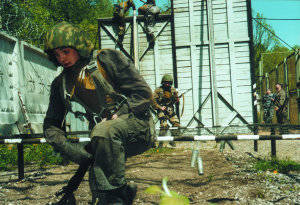 “Rusichi” by that time had already managed to distinguish themselves when conducting special operations on the seizure weapons and clearing away the illegal armed formations on the northern outskirts of Grozny in the Katoyama area, the Rodina state farm. In the residential area of Gorodok Ivanovo, reconnaissance detachments under the command of the deputy chief of staff, Major Vladimir Batrukeev, discovered a militants' safeguard apartment, the entrance door to which covered the F-1 grenade on a banner. Having disarmed the mine trap and having inspected the apartment, the intelligence officers found important documents and seized a large amount of small arms ammunition.
“Rusichi” by that time had already managed to distinguish themselves when conducting special operations on the seizure weapons and clearing away the illegal armed formations on the northern outskirts of Grozny in the Katoyama area, the Rodina state farm. In the residential area of Gorodok Ivanovo, reconnaissance detachments under the command of the deputy chief of staff, Major Vladimir Batrukeev, discovered a militants' safeguard apartment, the entrance door to which covered the F-1 grenade on a banner. Having disarmed the mine trap and having inspected the apartment, the intelligence officers found important documents and seized a large amount of small arms ammunition. February 25, the detachment commander, Colonel Pavel Zaitsev, led his fighters to perform another task: to organize the search and destruction of illegal armed formations in the settlement of Aldy together with other units of the ODON. The morning was foggy. Colonel Zaitsev at KP gave final orders: to Deputy Chief of Staff Major Vladimir Batrukeev on the course of actions of the maneuver group he headed, Chief of Communications to Senior Lieutenant Viktor Klochkov and Head of Radio Station to Senior Sergeant Yuri Frolov on organizing communication with the commanders of the stations and the interacting units. Suddenly, not far from the concentration point of the detachment, a car appeared, the driver stopped the engine, and a distinct Russian speech was heard. So, their own. But among the interacting forces they do not appear. Before Colonel Zaitsev had time to order the chief of intelligence to contact them and clarify what task they were here, a fire arrow separated from the machine and, dragging a long hose, swept over the special forces' heads. The next moment, the fiery head disappeared into the misty sky, and the tail, which is also a charge of clearance, landed directly on the heads of the special forces, riot policemen and fighters from other units. “Get down!” - a few voices merged into one. After a moment, a powerful explosion echoed, killing more than thirty people. The command post of the “Rus” detachment was in its epicenter. The commander of the detachment, Colonel Pavel Zaitsev, was killed, Major Vladimir Batrukeev and Senior Sergeant Yuri Frolov were fatally injured, Senior Lieutenant Viktor Klochkov and private sniper Alexei Panteleev died in hospital beds from injuries and burns ...
The bitterness of the first losses did not break the morale of the “Russians”. Risky operations were carried out almost daily, in the intervals between them, soldiers and sergeants under the guidance of the commanders of the groups were preparing to pass qualifying examinations for the right to wear the maroon beret. Meanwhile, on the day when the detachment celebrated its first anniversary, the commander of the Vityaz squad, Lieutenant Colonel V. Nikishin, for courage and heroism in combat operations presented the spotted berets to Lieutenant Colonel V. Salamatin and V. Ivanov, Major S. Yushkov, captain G. Moryakov , lieutenants S. Butcherko and V. Rogov, sergeants E. Tkachev and Yu. Pronik. This made it possible already in the detachment to form a council of the "krapovi berets", to create qualifying commissions and to take examinations for the right to wear the shrine of special forces. A few weeks later, such a council was created, and the chief of intelligence, Major Sergey Yushkov, was unanimously elected as its chairman. And in October, the first exams were held. The organization of all the work was assisted by brothers from “Vityaz”. According to the results of the march-throw, the fulfillment of the elements of acrobatics, the complex of special exercises and hand-to-hand combat during 12 minutes with the change of three partners, the brotherhood of the “red berets” was replenished with new representatives of special forces.
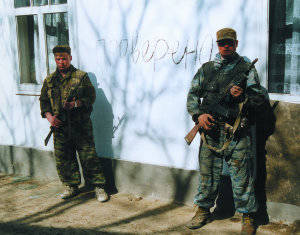 But the real combat situation arranged the exams more seriously. October 6 group "Rusich" performed the task of guarding and escorting the commander of the combined group of federal troops in the Chechen Republic, Lieutenant-General Anatoly Romanov. Despite the negotiations, the irreconcilable did not miss the slightest opportunity to show their strength. At noon, under the railway bridge in the area of Minutka Square, just at the moment when a car with Lieutenant-General Romanov was passing under it, a radio-controlled landmine was blown up. While in the front seat of the car, Private Denis Yabrikov took over most of the fragments from the explosion, shielding the commander. Denis died of multiple fragmental wounds on the way to the hospital without regaining consciousness.
But the real combat situation arranged the exams more seriously. October 6 group "Rusich" performed the task of guarding and escorting the commander of the combined group of federal troops in the Chechen Republic, Lieutenant-General Anatoly Romanov. Despite the negotiations, the irreconcilable did not miss the slightest opportunity to show their strength. At noon, under the railway bridge in the area of Minutka Square, just at the moment when a car with Lieutenant-General Romanov was passing under it, a radio-controlled landmine was blown up. While in the front seat of the car, Private Denis Yabrikov took over most of the fragments from the explosion, shielding the commander. Denis died of multiple fragmental wounds on the way to the hospital without regaining consciousness. Two weeks later, Private Dmitry Yashin died in a military hospital. With Yabrikov they were called at one time. Dmitry in April was seriously wounded, half a year the doctors fought for his life. But to save the soldier failed.
The attacks on military outfits and the locations of units practically did not cease. Militants gradually penetrated into the cities of Chechnya occupied by federal troops, and after a while it was almost impossible to control the city at night. And by mid-December 1995, the Dudayevites, who had saved up their strength, decided to seize the second largest city in Chechnya, Gudermes. Partially they succeeded. The few units of the internal troops were blocked and forced to fight in the environment. Local guards fled at the first shots. 14 people from two special forces groups of the “Rus” squadron flew by helicopter to Gudermes to assist the blocked garrisons in the hospital, the commandant’s office and the railway station.
An army convoy consisting of three ZILs was ambushed, urgently needed to be released. For the landing of "Rusich" allocated three Betera, two tank for reinforcement and fire support. The tank in the column went first. Among the one- and two-story buildings, they quickly orientated themselves and soon jumped out to the cars frozen on the road. Having fired a long line of fire from a machine gun, under the cover of dismounted special forces, tankers picked up the nearest car with ammunition with a cable and dragged them to their own. Running up to the shot ZILs, the commandos saw a terrifying picture: nine soldiers were lying in pools of blood. Dudayevites wounded the wounded with shots to the head. The militants knew that Russian soldiers would come to rescue the convoy. The appearance of so many armored vehicles at first was somewhat stunned. But having estimated that secrecy, surprise and a numerical advantage are on their side, the Dudaevs decide to attack the "Rusich". The commandos, on the other hand, took up comfortable positions and smashed militants with well-aimed fire, covering up comrades who loaded the bodies of the dead onto armor. When the bandits began to cover the flanks and there was a threat that they could cut off the road back, it was decided to leave the battle.
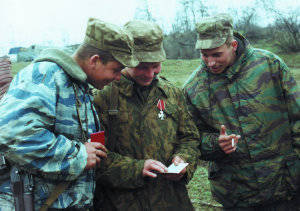 The columns of federal forces sent to free the hostages were blocked by militants on the distant approaches. Their further progress was impeded by the fire of grenade launchers and small arms from firing positions in dilapidated buildings. Special Forces of the “Rus” detachment were again thrown to the aid of the army team.
The columns of federal forces sent to free the hostages were blocked by militants on the distant approaches. Their further progress was impeded by the fire of grenade launchers and small arms from firing positions in dilapidated buildings. Special Forces of the “Rus” detachment were again thrown to the aid of the army team. ... From an ambush the fire opened unexpectedly and immediately from all the trunks. From the very first bullet, Private Oleg Belyaev fell dead from his armor. The group’s senior lieutenant Nazarenko managed to send a team to occupy a perimeter defense, and immediately a bullet took him out. Lieutenant Shatalov assisted with first aid to get off the armored carrier Nazarenko. Brought to Khankala - and immediately to the operating table. Then three more operations in the North - and in Rostov.
Captain Gennady Moryakov issued a proposal to the “Krapovye Berets” council: to hand over the krapovy to the lieutenant Vasily Nazarenko for military merit. The Council decided to note in a similar way the military prowess of other Special Forces soldiers who distinguished themselves in Gudermes.
Sailor was appointed senior in the escort group “two hundred” who died in that battle. He brought to the Rostov hospital the shrine of the special forces, to which Vasily Ivanovich was so eager. Nazarenko lay pale. By this time he had two more operations. Seamen came up with Shatalov, handed a maroon beret, congratulated. Basil brought the beret to dry lips, kissed. The courageous man, who had not shed a single tear during these two days, wept. The next day he was gone ...
Krapov beret was marked by the courage and courage of Oleg Dolgov, he showed in the battles in Gudermes. A more serious test of him, as well as other special forces of the “Rus” detachment, was waiting for a month later. Dudayev’s terrorists, led by Raduyev, attacked Kizlyar and took more than a hundred people hostage.
As soon as a helicopter with a group of “Russians” landed at a local airport and they occupied the all-round defense, they immediately opened fire on them from factory buildings surrounding the airfield. Several attacks followed, and only after sustaining significant losses, the sideguards refused to attempt to seize the airport and retreated to the city.
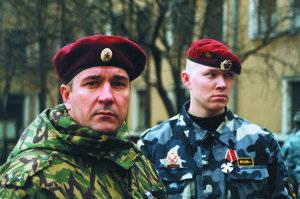 A "Rusich" soon receive another task: to assist the local special motorized military unit. 12 people on an armored carrier leave for an unfamiliar city. We drove several blocks and suddenly saw a Zhiguli and a police UAZ on the side of the road. Immediately the bullets whistled, Alexander Popov rolled off his armor with a wound through. Special Forces officers dismounted and, hiding behind the batteer, responded with fire. It turned out they went to the hospital seized by terrorists. The fighters who did not expect the appearance of the feds quickly came to their senses, the fire began to grow with every second. Sergeant Alexander Matantsev, mortally wounded, was wounded in the leg, Colonel O. Sobokar, who led the group, fell to the ground; the gunner of the machine gun and the driver of the armored personnel carrier were injured. From a strike from an RPG, the Beteer rolled back, rested aft on a tree and died out. It was necessary to go out from under the fire, to take out the wounded. But there is no one to carry the BTR. Then the fighter of the squad Alexander Rassadkin dives into the hatch, gets behind the wheel, and the fighting machine comes to life. The militants failed to destroy the armored personnel carrier and break the resistance of the “Russians” ...
A "Rusich" soon receive another task: to assist the local special motorized military unit. 12 people on an armored carrier leave for an unfamiliar city. We drove several blocks and suddenly saw a Zhiguli and a police UAZ on the side of the road. Immediately the bullets whistled, Alexander Popov rolled off his armor with a wound through. Special Forces officers dismounted and, hiding behind the batteer, responded with fire. It turned out they went to the hospital seized by terrorists. The fighters who did not expect the appearance of the feds quickly came to their senses, the fire began to grow with every second. Sergeant Alexander Matantsev, mortally wounded, was wounded in the leg, Colonel O. Sobokar, who led the group, fell to the ground; the gunner of the machine gun and the driver of the armored personnel carrier were injured. From a strike from an RPG, the Beteer rolled back, rested aft on a tree and died out. It was necessary to go out from under the fire, to take out the wounded. But there is no one to carry the BTR. Then the fighter of the squad Alexander Rassadkin dives into the hatch, gets behind the wheel, and the fighting machine comes to life. The militants failed to destroy the armored personnel carrier and break the resistance of the “Russians” ... The commander of the “Rus” detachment, Colonel Vladimir Ivanov, in one of his interviews said: “Special Forces are a collective, and the person dedicates himself to him all without a trace, because he feels: this is a great thing, a thing that cannot be changed. You can’t leave your squad, you can’t lose heart, you can’t leave your comrade in battle. ” It is like a commandment. And this commandment "Rusich" always followed.
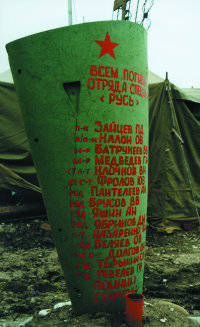 A few days after the Kizlyar battles, 12, a man of the “Rus” detachment, together with the brothers from the “Vityaz”, take part in the storming of the fortified positions of the militants in Pervomaisk. Especially intense was the second day of the assault. In the midst of the battle, one of the groups that advanced farthest into the depths of the village was under the heavy fire of militants. Ammunition is running out, but it's a pity to depart. So much work and risk this road cost. On the radio station are asked to bring ammunition. The commander of the squad "Vityaz" sends to them the second group of "Rus". They took the shortest, but dangerous route: through a sweep wasteland. Overcoming it with a box of ammunition was not easy. However, they succeeded. But growing into the ground, when it was impossible to raise heads under the fire of the militants, it was not easy to find your little brothers. The group began to move back along the wasteland. To do this was even more difficult. “Spirits” focused on them hurricane fire. Oleg Dolgovu bullet scratched his neck, Alexander Kiriyenko stitched palm. Shooting, "Rusich" got to the house, standing opposite the positions of the wanted group, they had already seen each other. They would have made another breakthrough. But the sniper bullet hit Oleg Dolgov right in the heart.
A few days after the Kizlyar battles, 12, a man of the “Rus” detachment, together with the brothers from the “Vityaz”, take part in the storming of the fortified positions of the militants in Pervomaisk. Especially intense was the second day of the assault. In the midst of the battle, one of the groups that advanced farthest into the depths of the village was under the heavy fire of militants. Ammunition is running out, but it's a pity to depart. So much work and risk this road cost. On the radio station are asked to bring ammunition. The commander of the squad "Vityaz" sends to them the second group of "Rus". They took the shortest, but dangerous route: through a sweep wasteland. Overcoming it with a box of ammunition was not easy. However, they succeeded. But growing into the ground, when it was impossible to raise heads under the fire of the militants, it was not easy to find your little brothers. The group began to move back along the wasteland. To do this was even more difficult. “Spirits” focused on them hurricane fire. Oleg Dolgovu bullet scratched his neck, Alexander Kiriyenko stitched palm. Shooting, "Rusich" got to the house, standing opposite the positions of the wanted group, they had already seen each other. They would have made another breakthrough. But the sniper bullet hit Oleg Dolgov right in the heart. Soon followed by a team to take all groups to their original positions. Only the next day, Pervomayskoye was cleared of bandits. It is a pity that Oleg will not know about it. By the decree of the President of Russia, Oleg Dolgov was awarded the title Hero of Russia for courage and heroism.
The Chechen war for the “Russians” was not over yet, it was not interrupted by the battle losses either. A week after Pervomaisky, Private Sergey Tyrykin was fatally wounded, and in April, in the area of Vedeno, “Rus” lost another fighter - Sergey Tevelev.
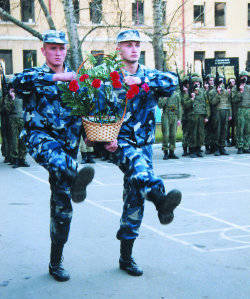 In early August, the militants attempted to seize Grozny. On August 19, sergeant Andrey Vasilenko was performing a combat mission to unlock one of the federal forces checkpoint in the southern part of the city. While on the move in the center of Grozny, the reconnaissance group came under heavy fire from militants. Sergeant Vasilenko took the defense and led the actions of subordinates. When the gangsters hit one of the armored personnel carriers, Andrei dispersed his subordinates in such a way that it allowed him to provide protection for the combat vehicle and provide assistance to the wounded. As a result of the explosion, the sergeant was contused, but did not leave the battle, he continued to lead subordinates. At the critical moment of the battle, the brave scout was wounded. Brothers carried him to a safe place, provided medical assistance. On the way to hospital, sergeant Andrei Vasilenko died.
In early August, the militants attempted to seize Grozny. On August 19, sergeant Andrey Vasilenko was performing a combat mission to unlock one of the federal forces checkpoint in the southern part of the city. While on the move in the center of Grozny, the reconnaissance group came under heavy fire from militants. Sergeant Vasilenko took the defense and led the actions of subordinates. When the gangsters hit one of the armored personnel carriers, Andrei dispersed his subordinates in such a way that it allowed him to provide protection for the combat vehicle and provide assistance to the wounded. As a result of the explosion, the sergeant was contused, but did not leave the battle, he continued to lead subordinates. At the critical moment of the battle, the brave scout was wounded. Brothers carried him to a safe place, provided medical assistance. On the way to hospital, sergeant Andrei Vasilenko died. During the conduct of hostilities 110 fighters of the detachment “Rus” were injured. For courage and heroism shown in the performance of special tasks in the Chechen Republic, the 316 servicemen of the detachment were awarded orders and medals of Russia.
The commander of the “Rus” detachment, Colonel Pavel Zaitsev, and the shooter of the 2 special purpose group, Hero of the Russian Federation, Private Oleg Dolgov, are forever enrolled in the squadron’s lists.
Fourteen people from the “Rus” squad laid down their heads on the battlefields of the Chechen Republic. “We didn’t have a single prisoner, not a single missing person, not a single case of refusal to comply with an order,” said the squad commander, Colonel Vladimir Ivanov. “Can one not be proud of such selflessness, devotion, loyalty to the oath?”
February 25 for “Rus” - a mournful day of memory of the fallen brothers. On this day in 1997, a monument to the courage and valor of the Special Forces soldiers was solemnly opened on the territory of the unit. Now, both in winter and in summer, fresh flowers do not wither near it.
The brothers of the “Rus” detachment remember their heroes.
Information